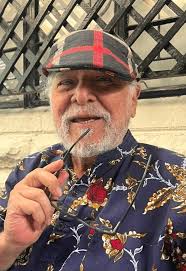
By all accounts, Sudhir Kumar Vidyarthi was not just a man who lived a long life — he lived a full one.
From staying steadfast in the colour print business, which he has left behind as his legacy, to his bold engagement in political activism during the repressive days, Vidyarthi rests a satisfied man, having given his all to his family, profession and business.
Vidyarthi died on Thursday last week. The body of the Radio Africa vice chair and chairman of East FM was cremated on Sunday at the Hindu Crematorium in Kariokor.
According his eldest son Amar, Vidyarthi was a personable workhorse who always told them to “do tomorrow’s work today, do today’s work now”.
And growing up, Vidyarthi always joined them in childhood games and entertained their friends and guests with compassion and warmth, making the report “your parents are so cool” a frequent one from their friends.
Perhaps the pleasure in the heart of his children’s friends came from his ability to cook delicious meals for them.
Amar remembered that his father “loved to cook and to eat and to entertain”.
And he was a truly fantastic cook, “so much so that I remember several occasions when we were invited by friends for a home-cooked meal only to find out that Dad was the one who was expected to do the cooking!”
And he achieved all by the quiet but steadfast help of his wife of 48 years, Manohar, fondly known as Nana.
“She quietly organised everything in the background, cooked all the accompanying dishes and desserts, playing the consummate hostess,” Amar said.
Born in 1945 in Elementaita, raised in Nairobi and shaped by the landscapes of Tanzania, Uganda and later, the UK, Vidyarthi’s story reads like an odyssey.
But at its heart, it was always a love story. Love for people, for poetry, for politics and for possibility.
“My father was blind to race, caste, creed, gender, societal status and religion,” Amar said in a moving tribute he read during his funeral on August 17.
“He cared deeply for his family and for friends. He loved spending time with them, chatting on the phone (sometimes endlessly, it seemed), sending them messages. He never forgot a name or a face,” the grieving son said.
That incredible memory stayed with Vidyarthi even as age crept in and his faculties began to falter.
It didn’t stop him from doing what he did best: connecting.
“The messages have been pouring in,” Amar said, “from those friends and family from around the world. And beyond sadness and condolences, there is one common thread: that my father always remembered them and made the effort to stay in touch.”
His colour printing business on Kirinyaga Road at some point was in the crosshairs of politics because he printed some publications deemed radical by the Kanu establishment.
Vidyarthi’s social circle stretched across continents, bound by the warmth of his presence and the thread of WhatsApp conversations peppered with poetry, shayari and shared meals.
His passion for Urdu poetry was lifelong. “He could spend hours reciting shers and shairis from memory, and always seemed to have an appropriate couplet, ghazal or poem for each occasion,” Amar shared.
It became his love language, how he expressed, celebrated and connected with others.
More than just a businessman, Vidyarthi was also a political activist and a force during Kenya’s second liberation.
Following in the footsteps of his father, the freedom fighter Girdhari Lal Vidyarthi, he and his brothers Kul Bushan and Anil stood up to the Moi government, printing and supporting seminal publications, such as Viva Magazine and The People.
Ultimately, Vidyarthi’s true legacy is not in the businesses he built or the politics he championed, but in the people he touched, the eldest son said.
“His story lives on through us,” Amar said. “So please, honour his memory. Tell a joke, share a meal, message a friend, read some poetry or just spend time with family.”











